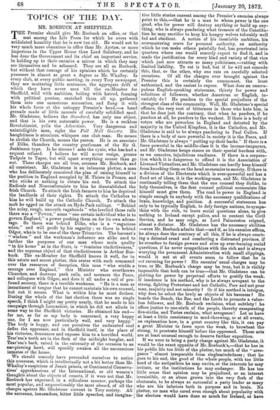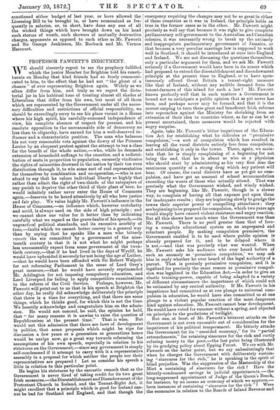TOPICS OF THE DAY.
MR. ROEBUCK AT SHEFFIELD.
THE Premier should give Mr. Roebuck an office, or that seat among the Life Peers for which he avers with acidulated humility that he is now too old. He would not be very much more obnoxious in office than Mr. Ayrton, or more imperious in the Upper House than Lord Salisbury, and he has done the Government and its chief an important service, in holding up to their enemies a mirror in which they may see themselves and be ashamed. They are all as Roebuck, but without that courage of his opinions which he certainly possesses in almost as great a degree as Mr. Whalley. In every club, at every public meeting, in every Tory newspaper, they are muttering little sentences, the aggregate drift of which they have never seen till the ex-Member for Sheffield, wild with ambition, boiling with hatred, foaming with political passion, snatched them all up, gathered them into one monstrous accusation, and flung it with his whole force at the unhappy Premier's head,—a hand grenade made of little morsels of carefully solidified mud. Mr. Gladstone, bellows the Standard, has only one object, and that is his own autocratic power. He is a reckless Revolutionist, yells the Advertiser. Very dangerous and unintelligible man, sighs the Pall Mall Gazette. His haughtiness is atrocious, whispers one club man. He means to abolish the Church, moans the parson. He is an associate of Dilke, thunders the country gentleman of the Sir G. Jenkinson type. Is he sincere asks the cynic, who has had a request refused. I believe he will never resign, groans Tadpole to Taper, but will upset everything sooner than go out. These charges are all true, screams Mr. Roebuck, and all consistent. Mr. Gladstone is an infamous plotter, a man who has deliberately conceived the plan of raising himself to the position in England occupied by M. Thiers in France, and who sticks at nothing to obtain his end. To attach the Radicals and Nonconformists to him he disestablished the Irish Church. To attach the Irish farmers to him he deprived the landlords of their rights. To attach the Catholics to him he will build up the Catholic Church. To attach the mob he egged on the attack on Hyde Park railings. "Behind the noisy, rough, uncouth vagabonds" who levelled those rails there was a "POWER," some "one certain individual who is to govern England," a power pushing them on for its own advan- tage. So there was behind Dilke, who is a "sagacious scion," and will profit by his sagacity ; so there is behind Odger, who is to be one of the three Triumvirs. The baronet's " wisdom " and the workman's influence are alike used to farther the purposes of one man whose main quality "in his home" as in the State, is "feminine vindictiveness," and the supreme object of that vindictiveness is Arthur Roe- buck. The ex-Member for Sheffield knows it well, for in this astute and secret plotter, this orator with such command over the resources of deception, this man "who wields a scourge over England," this Minister who overthrows Churches, and destroys park rails, and menaces the Peers, and collogues with Odger, and does it all under a veil of pro- found secrecy, there is a terrible weakness. "He is a man so incontinent of tongue that he cannot maintain his own counsel, but out it comes. What is within him he must declare. During the whole of the last election there was no single speech, I think I might say pretty nearly, that he made in his campaign through Lancashire, in which he did not allude in some way to the Sheffield victories. He obtained his end— for me, as far as my body is concerned, a very happy one, for I am now particularly well, and very happy." The body is happy, and one perceives the undaunted soul defies the oppressor, and in Sheffield itself, in the place of his victories, denounces and exposes him to a horrified world. Tear'em's teeth are in the flesh of the midnight burglar, and Tear'em's bark, raised in the extremity of the occasion to an ear-piercing howl, will speedily awaken all the unconscious inmates of the house.
We should scarcely have persuaded ourselves to notice this nonsense, which is intellectually not a bit better than Mr. Whalley's suspicions of Jesuit priests, or Continental Conserva- tives' apprehensions of the International, or old women's thoughts about the objects of comets, if it were not that Mr. Roebuck has expressed, in a ridiculous manner, perhaps the most popular, and unquestionably the most absurd, of all the charges against Mr. Gladstone current in Tory society. All the sarcasms, innuendoes, bitter little speeches, and imagina- tive little stories current among the Premier's enemies always point to this,—that he is a man to whom power is the one good, who for power will destroy anything or build up any- thing, who is always pondering what treasure of the Constitu- tion he may sacrifice to keep his hungry wolves tolerably well fed and obedient. A notion of his insatiable ambition, his overmastering crave for personal authority, an authority which he can make others painfully feel, has penetrated into. quarters where one would scarcely expect to find it, and is. made the justification for every kind and variety of that vice which just now attracts so many politicians,—ratting with limited liability. To rat is bad, but if he will not concede this, that, or the other, why one rats on carefully selectecl occasions. Of all the charges ever brought against the Premier this is certainly the commonest, the least authorized, and the easiest to expose. What does an unscru- pulous English-speaking statesman, thirsty for power and solicitous of followers, whether American or English, in- variably do ? He panders to the special prejudices of the strongest class of the community. Well, Mr. Gladstone's special offence, the very root of bitterness in those who hate him, is that he does just the contrary, that when he panders, if he panders at all, he panders to the weakest. If there is a body of voters who are powerless in England and detested by the majority in the United Kingdom, it is the Catholics, and Mr. Gladstone is said to be always pandering to Paul Cullen. If there is a body of men powerful in society it is the Peers, and Mr. Gladstone is always "putting up their backs." If there is a force powerful in the middle-class it is the income-taxpayers,. and Mr. Gladstone heaps stones on their special burdens with,. as we conceive, injudicious readiness. If there is a corpora- tion which it is dangerous to offend it is the Association of Licensed Victuallers, and Mr. Gladstone can hardly keep himself from knocking them on the head as enemies to society. If there is a division of the Electorate which is over-powerful and has a fixed set of ideas, it is the working-men, and Mr. Gladstone is continually telling them that the one counsel they dislike, to help themselves, is the first counsel political economists like himself must give them. The road to power in England is simple enough to anybody with the necessary qualifications of brain, knowledge, and position. A successful statesman has only to be typically English, to defy foreign nations, to sympa- thize with the rich, to leave social questions alone, to give nothing to Ireland except police, and to content the Civil Service, and he may reign, as Lord Palmerston reigned, almost a dictator. Mr. Gladstone has the necessary abilities —even Mr. Roebuck admits that—and if, as his enemies affirm, he always does the contrary of all this, if he is always court- ing a detested creed and comforting a distrusted province, if he crouches to foreign powers and stirs up ever-burning soda/ questions, if he never sympathizes with the rich and is always worrying the permanent Administration with small clippings, would it not at all events seem to follow that he is not ravening for power ? His enemies' usual charges may be true, or Mr. Roebuck's charge may be true, but it is visibly impossible that both can be true—that Mr. Gladstone can be plotting for power by perpetual efforts to gratify the weak. If insolence is his method, why is he always arrogant to the strong, fighting Protestant and not Catholic, Peer and not poor man, majority and not minority? Or if his method is intrigue, why does he select the lowly as objects of his baseness? He beards the Bench, the Bar, and the Lords to promote a value- less follower, and Mr. Roebuck exclaims, what subtlety! he offers justice to one-sixth of the people, thereby exasperating five-sixths, and Tories exclaim, what arrogance Let us have at least a little consistency in mud-throwing, or at all events, an explanation how, in a great country like this, it can pay a great Minister to fawn upon the weak, to browbeat the strong, to prostrate himself before the oppressed. Those acts are at least unusual enough to deserve further exposition.
If we were to bring a party charge against Mr. Gladstone, it would be the exact opposite of Mr. Roebuck's,—that he has in his public life too little of the plotter, too much of the " arro- gance " almost inseparable from singlemindedness ; that he goes to his end, the good of the whole people, with too little heed of the antipathies he may excite, or the interests he may irritate, or the institutions he may endanger. He has too little sense that opinion may be prejudiced, or an interest irresistible, or an abuse grown into the very flesh of the electorate, to be always so successful a party leader as many who are his inferiors both in purpose and in brain. No plotter, no man who cared even enough about popularity with the electors would have done so ranch for Ireland, or have
sanctioned either budget of last year, or have allowed the Licensing Bill to be brought in, or have economized so fre- quently in salaries, or, in short, have done any one of all the wicked things which have brought down on his head such storms of wrath, such showers of mutually destructive charges, opponents so opposed to each other as Mr. Fawcett and Sir George Jenkinson, Mr. Roebuck and Mr. Vernon Harcourt.



































 Previous page
Previous page